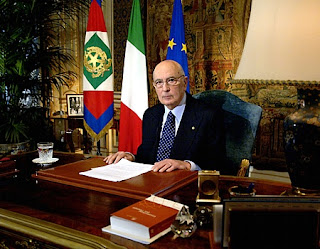Let’s take
it from the election of the new President of the Republic. Who is he, by the
way? Easy to remember: the same as before, Giorgio Napolitano, to turn 88 this
June.
The Italian
President is elected by Parliament. To be elected during one of the first three
votes, the candidate needs to reach a threshold of 2/3 of votes. This is
because our Constitution encourages the whole Parliament to elect a President
who is vastly approved. However, after the third vote the candidate only needs
a majority to win.
During the
election of the new President, we witnessed almost a breakup of the
Partito Democratico. As an Italian comedian said: “The Democratic Party
suggested a candidate (=Franco Marini), then the right voted for him, and the
left did not!”. That is in fact correct:
since the vote for a President is free and secret, one does not have to align
to the party’s line. The Democratic
Party proposed Franco Marini, who was voted by Berlusconi’s party too, and who
should have easily reached the threshold of the 2/3. But he didn’t, because a
lot of MPs from the Democratic Party in the end defected and did not vote for him. And so
Marini stepped down.
Following
that, the Democratic Party suggested Romano Prodi, former PM. Despite the fact
that the right did not approve of him, the party was supposed to vote for him in a
cohesive way, but again they didn’t. And Prodi stepped down too, after accusing
his party of causing him a really poor figure.
Meanwhile,
Beppe Grillo’s Five Star Movement, which had held an online vote to decide
their candidate for the presidency, was pressing for Stefano Rodotà. Rodotà has
a left-wing background and he is an esteemed jurist, but, for some reasons that
they never explained very convincingly, the Democratic Party would not vote for
him.
After two
days of pointless votes, on 20th of April the Italian Parliament
(still without a government at the time) asked Giorgio Napolitano to stand as a
candidate again. He accepted, and he was elected by a very vast majority. Napolitano is the first President in the history of the Italian Republic to serve on a second term. His re-election
has been criticised under several points of view; above all, he is really old,
and he had always claimed that he did not want to stand again. On the other
hand, there were a lot of people praising him for his courageous sacrifice and
his commitment to the nation. I am not the most qualified person to address his
decision to be re-elected, but I sincerely wish for him to stay in good health.
Regardless of what one might think of Napolitano, he has been, and he still
is, going through a lot, and even if I am talking about politics, I find it
hard not to feel empathy for someone who might not finish his term of
presidency alive and yet accepted the job.
When
Napolitano gave his acceptance speech, he was really harsh towards the parties which have
been unable to deliver reforms, included a new electoral law (ironically, the
very same parties cheered and applauded him a lot while he was saying so).
Then
Napolitano called Enrico Letta (46-year-old and relatively low-profile) from the
Democratic Party, to be the new PM of a grand coalition which will include
Berlusconi’s party too, in order to have a majority in both chambers.
Giorgio Napolitano and Enrico Letta
Today Letta
announced the members of his Cabinet. It is immediately evident that Berlusconi
will play again a fundamental role in the country’s politics, as proved by the
assignment of some key portfolios to members of his party. Above all, Angelino
Alfano, Berlusconi’s pupil, is the new Home Secretary.
Here you
will find the list of all the Ministers and information about Letta: http://www.bbc.co.uk/news/world-europe-22323850- Italy PM-designate Enrico Letta agrees new government
To conclude
this long post, I have a brief consideration. Studying Politics here in the UK,
when I heard the phrase “grand coalition” and when I learned that in some
countries it is possible for the left and the right to govern together
effectively, I was pleasantly surprised. I found it really democratic, and a
great sign of cooperation for the sake of the country. In other words, I saw it
in a very positive light. But in Italy, the most common word used to translate “grand coalition”
is “inciucio”, which more or less I would
translate with “dirty deal”. There is actually a sort of rebellion towards the
Democratic Party, because it was not able to gain the support of the Five Star
Movement, and now is forming an alliance with Berlusconi, who should be
their archenemy.
I have no
troubles understanding why this is the case: Berlusconi destroyed the Italian right and
replaced it with the cult of his own person. And when he was in government, he
never failed to take care of his own trials or businesses before anything else. For an honest party, agreeing to cooperate with him is political suicide. And a “grand coalition”, in Italy, becomes a dirty deal.




